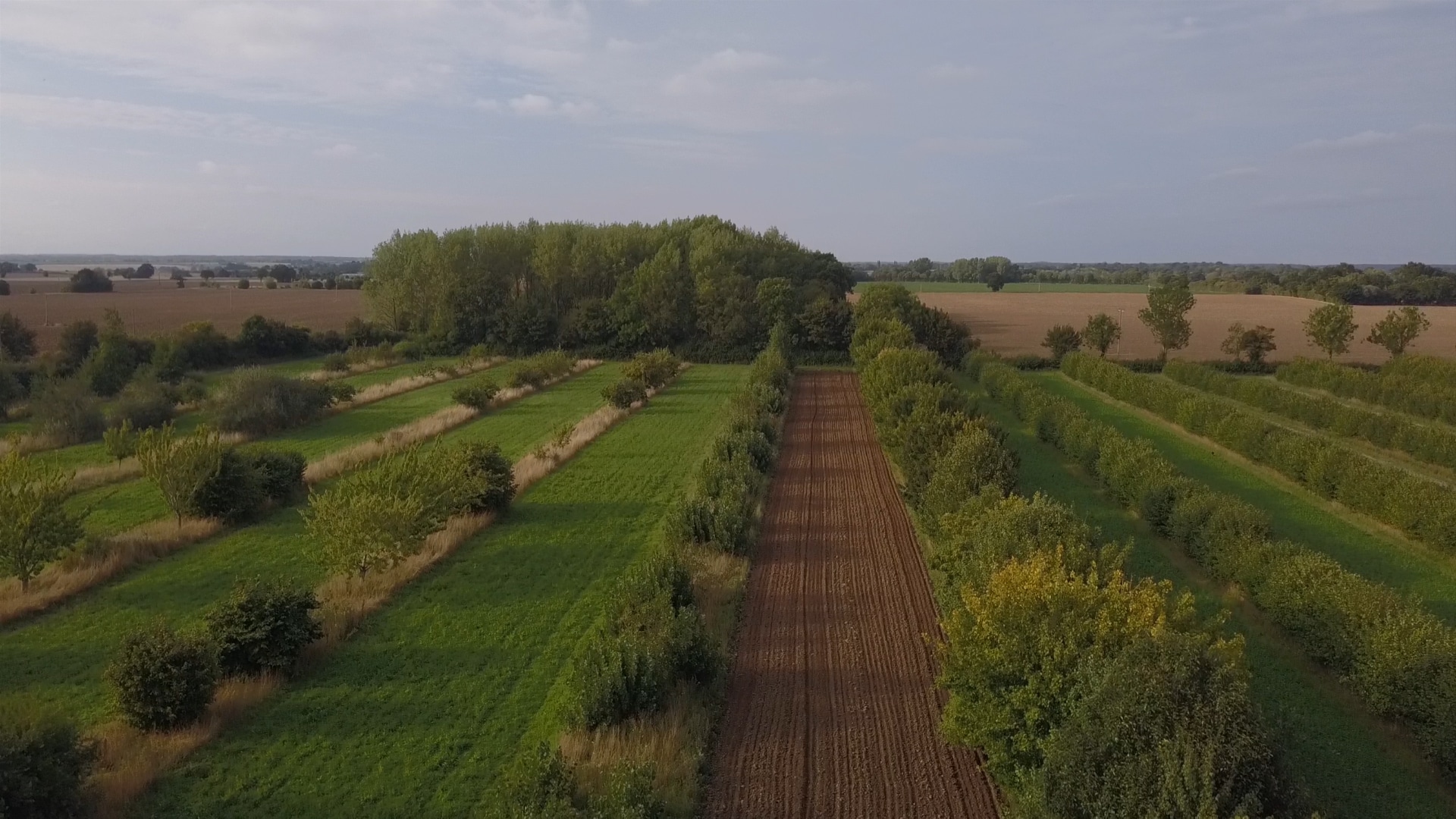It’s an overcast Saturday, the skies threatening showers. Children are running about, faces painted with brightly-coloured butterflies as the late-summer Community Butterfly Day comes to an end. Out the back, in a bright room at one end of the black-painted barn, cook and baker Henrietta Inman and a troupe of helpers are making their final preparations for the long-awaited, Covid-delayed launch of her new bakery.
The bakery is located at Wakelyns, a pioneering 56-acre farm in north Suffolk, famed among sustainable farming advocates for the way it combines long rows of trees with wide ‘alleys’ of crops—a form of agroforestry.
Agroforestry is an approach to farming that incorporates trees into systems of food production. There are various configurations, including silvo-pasture (trees and livestock) and silvo-arable (trees and crops), each overlaying different levels of production to create a diverse, dynamic, and productive farm system.
“It’s all about the power of diversity,” says Ben Raskin, the Soil Association’s head of horticulture and agroforestry. “The more complexity you have in any system, the more resilient and productive it is.”
Wakelyns was founded in the early 1990s by plant breeder and scientist Martin Wolfe and his wife, Anne, to experiment with this idea that resilience is a product of diversity, not of the hyper-simplification pursued by industrial agriculture. Wolfe planted a wide variety of fruit, nut, and timber trees, and developed a new, highly diverse variety of wheat to grow in the alleys, known simply as ‘YQ’.
“As cooks, bakers, and fruit pickers on the farm, agroforestry means diversity, beauty, abundance, joy, fulfilment, and connection,” explains Inman. “Working here every day, we witness just how productive this system is. Not only that, when it comes to getting into the kitchen, it’s producing really flavourful and nourishing food.”
Farming is often cited as a major culprit of greenhouse gas emissions and ecosystem decline. With COP26 – the world’s pre-eminent annual conference on climate action – having taken place this November in Glasgow, agriculture’s impact on the environment is once again in the spotlight.
Yet agroforestry is increasingly being recognised as a ‘nature-based solution’ (NbS), a term describing solutions for problems like climate change that work with nature to benefit people and biodiversity.
Research, much of which was carried out by the Organic Research Centre at Wakelyns itself, has found that agroforestry can store up to 63 tonnes of carbon per hectare, reduce soil erosion, prevent flooding, and improve biodiversity by increasing farmland habitat.
At the same time, a 2020 European study found that agroforestry systems are 36-100 per cent more productive than single-crop farming systems. And, according to a recent report from The Landworkers’ Alliance, agroforestry can also boost on-farm employment.
Thanks to the growing evidence of its benefits, agroforestry is increasingly popular with farmers, accompanied by a similar upswing in government support.
“I’ve been working on agroforestry for 12 years,” says Raskin, “and the last two years is the first time there’s been any positive policy support for it.”
After Martin Wolfe’s death in 2019, his children hosted a symposium in his honour – an opportunity for the Wakelyns community to propose ideas for what came next.
What emerged has been transformative, with the establishment of a number of different businesses and projects on the farm.
David Wolfe, one of Martin’s three children, who has taken on responsibility for the farm along with his wife, Amanda, said the farm was set up as his parents’ “personal science project,” and so was ill-suited to full commercial operation. “It was a bit like inheriting a working steam museum,” he says.
But, by adding various new enterprises into the mix, the Wolfes and the rest of the community have been able to make things add up. Wolfe calls this approach “enterprise stacking,” which, he says, “is a way of bringing activity and people to the farm.”

One of the new businesses that has been established on the farm is Inman’s Wakelyns Bakery.
Inman, alongside fellow cook and baker Maisie Dyvig, bakes bread, makes pastries, and brews up jams and preserves for their north Suffolk community, using the grain, fruit, and vegetables grown on the farm. “We stay flexible,” Inman explains, “like the farming system.”
Alongside the bakery is the RealVeg CSA – a community-supported market garden run by Chloe Tatum, Rachel Perry, and Holly Gregson in some of the alleys. Then there’s the Woodland Haberdasher, Fay Jones, who creates, and teaches others how to make crafts and objects from some of the materials grown at Wakelyns – from carved spoons to hedgerow dyes.
Just as agroforestry is increasingly being taken up by farmers across the country, there are also other farms beginning to experiment with the “enterprise stacking” approach taken at Wakelyns. For example, last year in Somerset, baker Rosy Benson established Field Bakery on Fred Price’s Gothelney Farm. And, in Fife, The Bowhouse combines mixed farming on the Balcaskie Estate with small-scale milling, a market garden, a cut flower grower, a brewery, and a butchery.
This layered approach builds greater diversity and closer connections right along the food chain. “Our customers see the benefits of what we do because they come to the farm and see where the food is coming from. They connect a bit more to the land, and the food, to us, and themselves,” says Inman.
“All those relationships bring so much more kindness and love. Our culture is lacking in a lot of that, and I think we need to remember those things that do bring true meaning and happiness.”
This article was originally published in the autumn-winter print edition of Wicked Leeks. You can read the full magazine for free on Issuu.









0 Comments